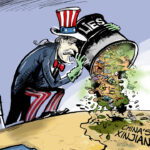A survey by the American Chamber of Commerce in Taiwan showed that some 77 percent of respondents said there hasn’t been significant disruption to their business operations amid the current situation in the Taiwan Straits. However, 17 percent said they had experienced disruption that partly stemmed from “changes in policies or other manifestations of concern from their offshore headquarters.”
An article published by the Voice of America on Wednesday, citing experts, concluded that the number of foreign companies actually leaving the island due to the situation in the Taiwan Straits is very limited. Still, concerns among global businesses about potential impact of cross-Straits tension, which has been stirred up by the separatist Democratic Progressive Party (DPP) authorities on the island and radical anti-China foreign politicians, should not be overlooked.
To an extent, the survey, which was conducted from August 8 to 17 following US House Speaker Nancy Pelosi’s provocative visit to the Taiwan island, is indicative of the growing market fears as to whether Taiwan’s economy will be hit by the heightened tensions.
In a clearer sign, the Taiwan stock market has seen a continuing exodus of foreign capital these days, and the escalating tensions in the Taiwan Straits are believed to be one of the main reasons. If the DPP authorities keep going down the wrong path, this will only be the beginning.
A stable business environment cannot be separated from a stable political environment. If anything, foreign companies on the island have now become more exposed to the risks caused by the DPP’s secessionist actions and provocative deeds of foreign politicians. More crucially, such moves put the island’s economy as well as the livelihood of the people in Taiwan region at risk.
This week alone saw governor of the US state of Indiana Eric Holcomb and a Japanese delegation led by Keiji Furuya, a Liberal Democratic Party lawmaker, visited the island, continuing a toxic trend of escalating tensions in the Taiwan Straits. Indeed, continuing tension in the region since Pelosi’s visit has a lot to do with the incessant provocations by Taiwan secessionist forces and radical foreign politicians.
Against this backdrop, it is increasingly important for businesses on the island to take the regional security and economic situation into account when it comes to future development. Extra caution in dealing with issues related to the Taiwan question is needed. For example, Apple told its suppliers to strictly comply with the Chinese mainland’s customs regulations that state Taiwan-made parts and components must be labeled as made either in “Taiwan, China” or “Chinese Taipei” to avoid shipments from being held for examination, Nikkei reported in early August.
Indeed, foreign companies that are seeking to conduct businesses in China, of which Taiwan is an inalienable part, should not take opportunistic approach when it comes to the Taiwan question.
Moreover, it should also be pointed out that the DPP authorities are trying to blame the mainland for the island’s current economic problems to justify its policy of pushing for a decoupling from the mainland market and boosting economic ties with the US.
The DPP has been keen on joining various US initiatives aimed at decoupling from the mainland, including the so-called “Chip 4” alliance and negotiations on a so-called trade initiative between the US and the island .
But the bottom line is that just as the island of Taiwan is an inalienable part of China, the regional economy is also inseparable from the mainland’s economy.
Riding on the giant ship of the mainland’s economy is the only right path forward for the Taiwan region. In this sense, the DPP’s pursuit of secessionist policies has gone against not just the interests of the Taiwan people, but also the law of economics and markets.
(Global Times)




